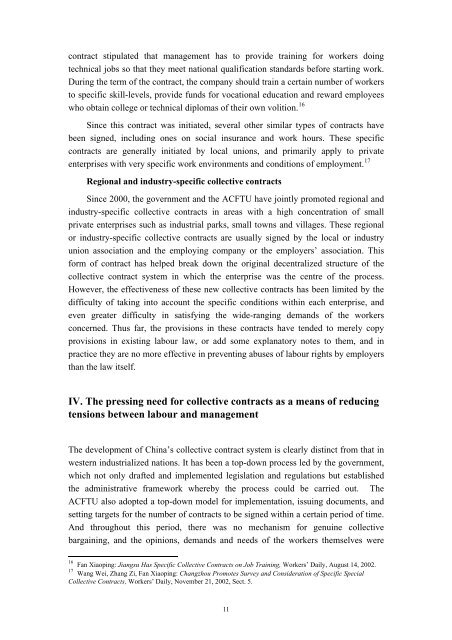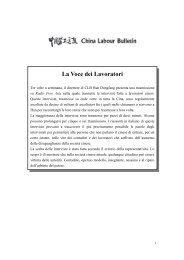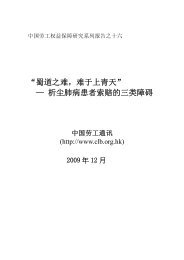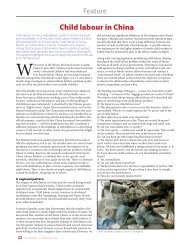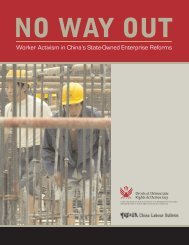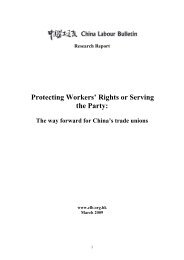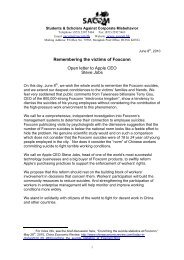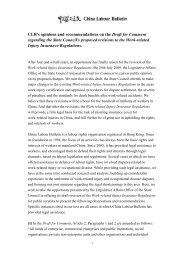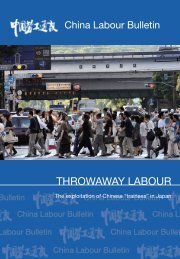here - China Labour Bulletin
here - China Labour Bulletin
here - China Labour Bulletin
You also want an ePaper? Increase the reach of your titles
YUMPU automatically turns print PDFs into web optimized ePapers that Google loves.
contract stipulated that management has to provide training for workers doing<br />
technical jobs so that they meet national qualification standards before starting work.<br />
During the term of the contract, the company should train a certain number of workers<br />
to specific skill-levels, provide funds for vocational education and reward employees<br />
who obtain college or technical diplomas of their own volition. 16<br />
Since this contract was initiated, several other similar types of contracts have<br />
been signed, including ones on social insurance and work hours. These specific<br />
contracts are generally initiated by local unions, and primarily apply to private<br />
enterprises with very specific work environments and conditions of employment. 17<br />
Regional and industry-specific collective contracts<br />
Since 2000, the government and the ACFTU have jointly promoted regional and<br />
industry-specific collective contracts in areas with a high concentration of small<br />
private enterprises such as industrial parks, small towns and villages. These regional<br />
or industry-specific collective contracts are usually signed by the local or industry<br />
union association and the employing company or the employers’ association. This<br />
form of contract has helped break down the original decentralized structure of the<br />
collective contract system in which the enterprise was the centre of the process.<br />
However, the effectiveness of these new collective contracts has been limited by the<br />
difficulty of taking into account the specific conditions within each enterprise, and<br />
even greater difficulty in satisfying the wide-ranging demands of the workers<br />
concerned. Thus far, the provisions in these contracts have tended to merely copy<br />
provisions in existing labour law, or add some explanatory notes to them, and in<br />
practice they are no more effective in preventing abuses of labour rights by employers<br />
than the law itself.<br />
IV. The pressing need for collective contracts as a means of reducing<br />
tensions between labour and management<br />
The development of <strong>China</strong>’s collective contract system is clearly distinct from that in<br />
western industrialized nations. It has been a top-down process led by the government,<br />
which not only drafted and implemented legislation and regulations but established<br />
the administrative framework w<strong>here</strong>by the process could be carried out. The<br />
ACFTU also adopted a top-down model for implementation, issuing documents, and<br />
setting targets for the number of contracts to be signed within a certain period of time.<br />
And throughout this period, t<strong>here</strong> was no mechanism for genuine collective<br />
bargaining, and the opinions, demands and needs of the workers themselves were<br />
16 Fan Xiaoping: Jiangsu Has Specific Collective Contracts on Job Training, Workers’ Daily, August 14, 2002.<br />
17 Wang Wei, Zhang Zi, Fan Xiaoping: Changzhou Promotes Survey and Consideration of Specific Special<br />
Collective Contracts, Workers’ Daily, November 21, 2002, Sect. 5.<br />
11


